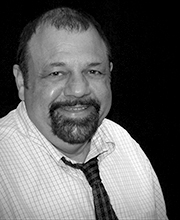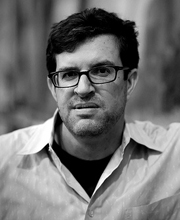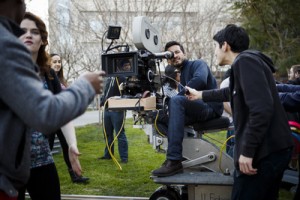By Jennifer Howard
When Martin Scorsese was 8 years old, growing up in New York’s Little Italy, he went with his father to see a 1951 British movie called The Magic Box. It features a scene in which Robert Donat, cast as the British cinema pioneer William Friese-Greene, shows moving pictures to a policeman (Laurence Olivier) who can’t believe what he’s seeing.
Like the bobby, the young Mr. Scorsese was astonished by the experience. “I believe this is what ignited in me the wonder of cinema and the passion” for it, he told the audience on Monday night at the 42nd Jefferson Lecture in the Humanities, held here at the Kennedy Center for the Performing Arts.
Mr. Scorsese’s talk, “Persistence of Vision: Reading the Language of Cinema,” was full of cinematic language. The director mixed reminiscences from a moviegoing childhood with sound and film clips from Vertigo, 2001: A Space Odyssey, Intolerance, The Great Train Robbery, The Day the Earth Stood Still, and other movies he has known and loved. He began not with words but with that scene from The Magic Box, after a warmup slide show of movie scenes and candid shots of the director on set with actors, all of it accompanied by music from Vertigo.
The Jefferson Lecture is the highest recognition the federal government gives for distinguished intellectual achievement in the humanities. In honoring Mr. Scorsese, the renowned director of Taxi Driver, Raging Bull, Goodfellas, The Age of Innocence, and many more movies, the National Endowment for the Humanities departed from tradition.
Jefferson Lecture recipients “until now have been masters of the written word,” James Leach, the endowment’s chairman, said in his introduction of Mr. Scorsese. The filmmaker’s work demonstrates that intellectual achievement can take place “outside the realms of the classroom and the word,” Mr. Leach said.
Mr. Scorsese said American culture is more and more inclined to judge a movie’s success by how big its box-office returns are. That “trivializes film,” he said. “We have to remember that there are other values beyond the financial.”
It’s time to throw out the idea that visual and verbal literacy are separate things, Mr. Scorsese said. His own parents “weren’t in the habit of reading,” he recalled, but they found in movies a way to connect with family and with life. What continues to fascinate him isn’t just the picture on the screen but what it conjures up in the viewer—”the image in the mind’s eye,” he called it. Cutting just one frame can change that image. “This is what’s called the language of cinema,” he said.
At times Mr. Scorsese sounded nostalgic for the kinds of movies that he grew up with and that his generation of di- rectors made. That kind of cinematic experience is “almost gone,” he said, “overwhelmed by images coming at us all the time.” But one can lament the passing of celluloid, as he does, and still be excited by the possibilities of the present and curious about where young moviemakers will take things next, the director said.
“We have no choice but to treat all these images coming at us as a kind of language,” he said. “In the end, there is only literacy .”
Mr. Scorsese has become very involved in the cause of film preservation, and he brought the curtain down with a pas- sionate call to preserve our movie heritage. Vertigo and many other films now considered masterpieces were neglected and almost lost, and 90 percent of all silent movies ever made have vanished, he told the crowd.
“We really have to take good care of what’s left, from the acknowledged masterworks of cinema to industrial films and home movies,” he said. “The moment has come when we need to treat the moving image as reverently as every last book in the Library of Congress.”
Why should we preserve everything we can of this exuberant art form that, while not unique to America, has come to be so closely tied up with American culture? “Because we can’t understand where we’re going until we know where we’ve been,” Mr. Scorsese said.
Posted (but not written) by Prof. Harry Mathias



